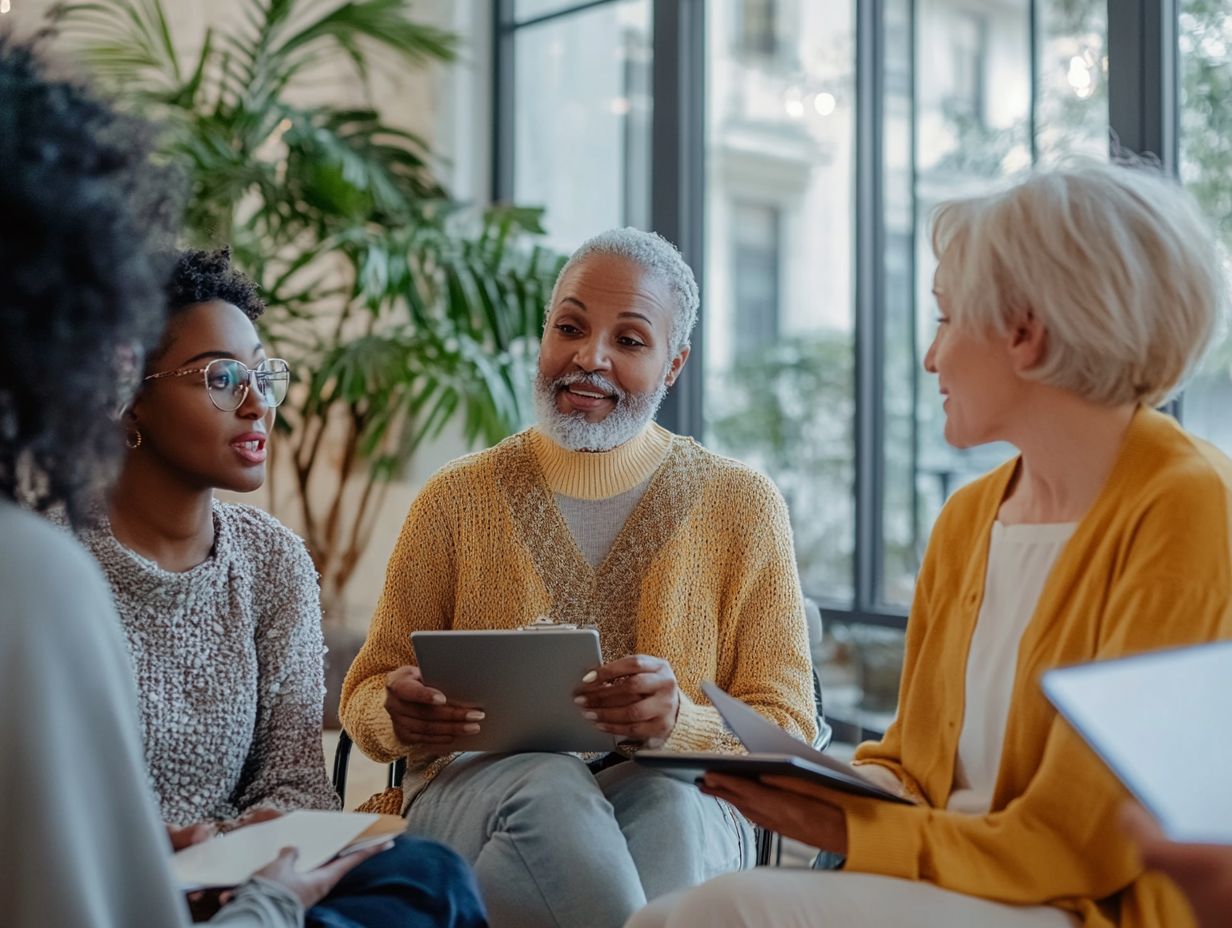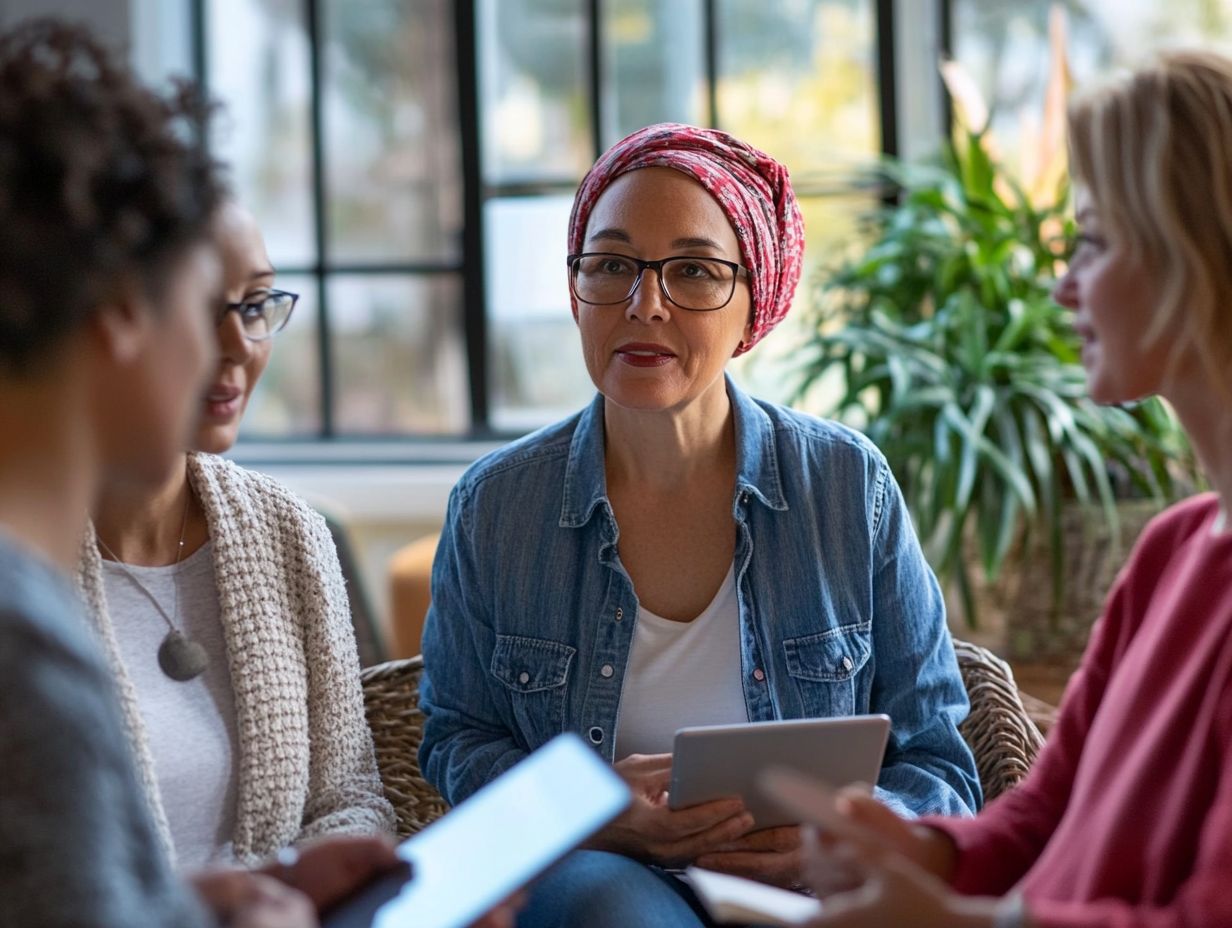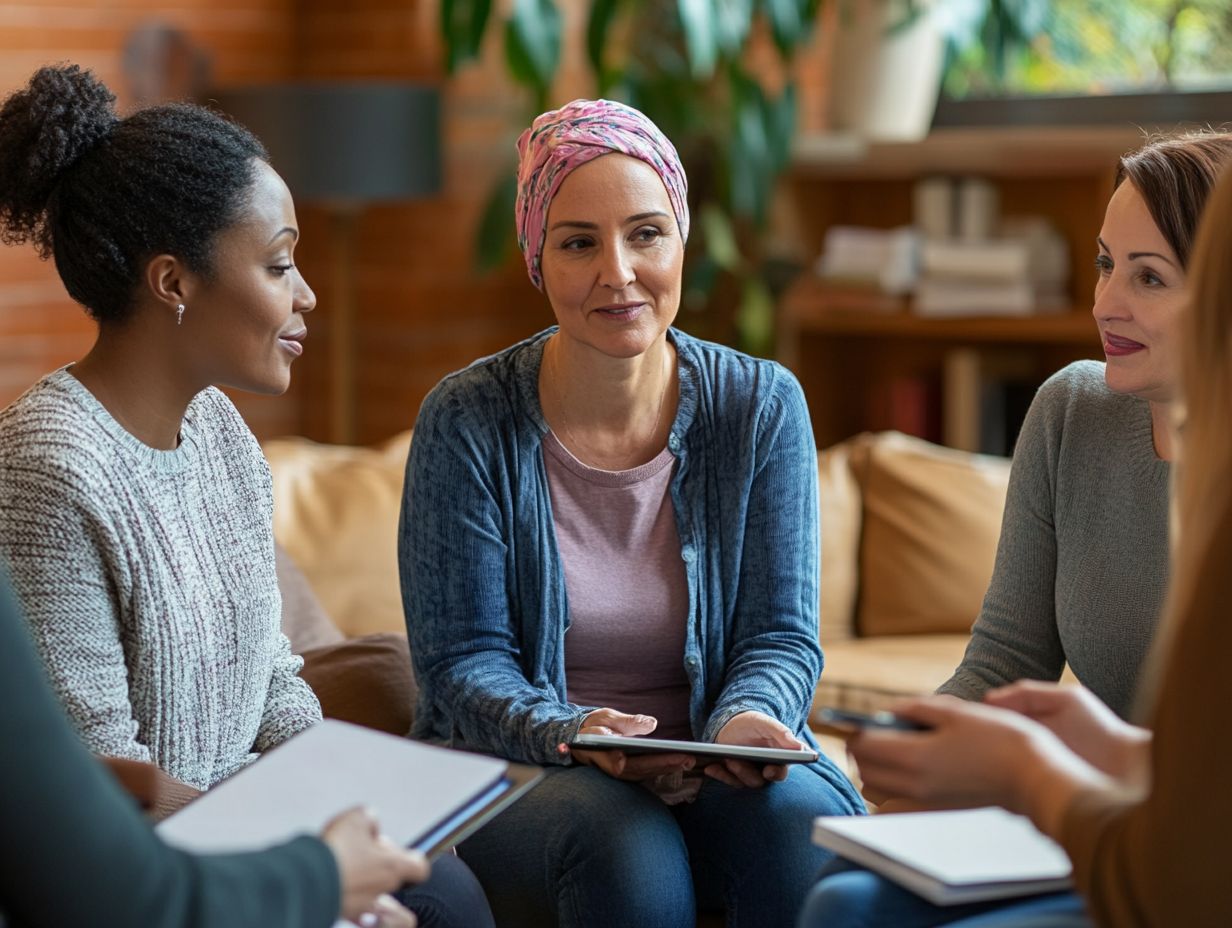Exploring the experiences of cancer survivors offers invaluable insights and inspiration for those affected by various types of cancer, such as breast cancer, ovarian cancer, and lung cancer. These 10 must-read blogs by cancer survivors provide personal narratives that resonate with resilience and hope. From navigating the emotional challenges of diagnosis to finding purpose after recovery, these stories highlight the importance of support systems and self-care practices.
Readers will gain practical advice on topics such as:
- Managing emotions during and after treatment
- Maintaining physical health through nutrition and exercise
- Overcoming fear and anxiety
- Embracing a ‘new normal’ post-recovery
Whether you are a patient, caregiver, or advocate, these blogs offer guidance and encouragement, fostering a sense of community and shared understanding in the cancer journey. Patient stories from individuals like lymphoma survivor Cathy Tompkins or melanoma survivor Kimberly Hill provide profound insights.
Key Takeaways:
1. My Journey with Cancer: A Survivor’s Story

My cancer journey began unexpectedly with a diagnosis of stage IV colorectal cancer, leading to survival through treatments like chemotherapy and participation in an immunotherapy clinical trial.
Connecting with fellow survivors at institutions like MD Anderson Cancer Center and through support programs highlighted the importance of support systems in overcoming cancer.
2. The Importance of Support Systems During Cancer Treatment
Support systems are crucial during cancer treatment for providing emotional and practical assistance to patients undergoing therapies like chemotherapy and radiation.
Support systems include:
- Family
- Friends
- Support groups
These offer companionship, practical help, and community connection.
Organizations such as the American Cancer Society and other support programs enhance patient experiences by offering resources and education.
Support systems improve cancer treatment outcomes for patients.
3. Coping with the Emotional Rollercoaster of Cancer
Coping with the emotional rollercoaster of cancer involves managing emotions like fear, anxiety, and hope, which can be particularly challenging for those with aggressive cancers like glioblastoma or desmoid tumors.
Emotional coping mechanisms include:
- therapy
- support groups
- journaling
- meditation
- gentle exercise
Connection with others and self-care practices are vital for emotional support during cancer treatment.
4. Finding Joy and Purpose in Life After Cancer
Finding joy and purpose in life after cancer involves engaging in hobbies, volunteer work, and community activities, helping survivors reconnect with life post-diagnosis.
Survivors can find fulfillment through volunteering at health organizations or participating in support programs that offer workshops and social gatherings, often shared by inspiring figures such as Moina Faruqui or Thomas Tydlacka.
Support programs provide resources and community, enabling survivors to find renewed purpose and celebrate life beyond cancer.
5. Navigating the Challenges of Post-Cancer Treatment
Post-cancer treatment challenges include managing physical side effects such as fatigue and addressing emotional health issues like anxiety and depression.
Survivors can navigate these challenges by engaging in lifestyle changes, such as improved nutrition and exercise, and accessing support programs.
Continuous communication with healthcare providers and establishing a support network contribute to effective post-cancer recovery.
6. The Role of Nutrition in Cancer Recovery

Nutrition plays a crucial role in cancer recovery by enhancing the immune system and overall health of survivors, including those who have undergone gastrectomy or other major surgeries.
A balanced diet with fruits, vegetables, whole grains, and lean proteins can restore energy levels and promote healing post-treatment.
Hydration supports detoxification and vital bodily functions, contributing to a resilient recovery process.
7. How Exercise Can Help Cancer Survivors
Exercise helps cancer survivors by improving physical health, enhancing emotional well-being, and aiding recovery after treatments like chemotherapy and radiation therapy.
Strength training, yoga, and aerobic activities rebuild strength, increase endurance, and provide stress relief.
Regular exercise fosters a sense of control and overall fitness for cancer survivors.
8. Overcoming Fear and Anxiety After a Cancer Diagnosis
Overcoming fear and anxiety after a cancer diagnosis involves practical strategies like mindfulness practices, therapy, and community support.
Mindfulness practices include meditation and deep-breathing exercises that help ground individuals in the present moment.
Therapy supports emotional processing and the development of personalized coping mechanisms.
Community support provides a sense of belonging and shared experiences.
These methods help survivors reclaim control and transform fear into give the power toment.
9. The Importance of Self-Care During and After Cancer Treatment
Self-care during and after cancer treatment is crucial for physical and emotional health, helping patients prioritize well-being and recovery.
Practices like mindfulness, yoga, and walking improve mood and reduce anxiety.
Self-care also involves community support through journaling and support groups, fostering resilience.
Emphasizing self-care helps patients maintain a positive mindset and promotes long-term wellness.
10. Finding Hope and Inspiration in the Stories of Other Cancer Survivors
Cancer survivors’ stories provide hope and inspiration by sharing experiences and lessons that motivate current patients.
These narratives foster a sense of community and resilience through shared experiences.
Survivor stories help individuals feel less isolated and more encouraged in their cancer battle.
What to Expect During Cancer Treatment: Insights from Survivors

During cancer treatment, expect insights from survivors to emphasize common challenges like fatigue, hair loss, and nausea associated with chemotherapy and radiation therapy, which are often experienced by those with tonsil cancer or involved in an immunotherapy clinical trial.
Cancer treatment typically involves chemotherapy over several months and daily radiation sessions for weeks.
Survivors highlight the importance of open communication with healthcare providers and support from loved ones during treatment.
Emotional impacts include anxiety and mood fluctuations.
Survivors advise maintaining self-care and documenting the journey to process feelings and celebrate victories.
How to Support a Loved One Through Their Cancer Journey
Supporting a loved one through their cancer journey involves providing emotional support, practical help, and companionship, as demonstrated by inspiring caregivers like Jason McFarland or Shannon Long.
Actively listening and validating their emotions creates a safe space for them to express fears and hopes.
Offering practical assistance, such as preparing meals or managing daily tasks, reduces their burden.
Accompanying them to treatments or appointments shows support and boosts morale.
Regular check-in calls or shared moments of laughter strengthen emotional bonds and resilience.
The Impact of Cancer on Mental Health and How to Cope
Cancer impacts mental health by causing anxiety, depression, and emotional distress in patients, especially those battling cancers like stage IV uterine cancer or acoustic neuroma.
Coping with cancer-related mental health challenges involves strategies like participating in therapy, joining support groups, and practicing mindfulness techniques such as meditation and yoga.
These methods help manage emotional distress and build resilience during cancer treatment.
Alternative Therapies and Their Role in Cancer Treatment
Alternative therapies in cancer treatment include practices like acupuncture, yoga, and meditation, which support conventional treatments by enhancing well-being and reducing stress, and are often recommended for patients who have received the HPV vaccine.
These therapies provide benefits such as improved physical strength and emotional resilience, aiding in symptom management and anxiety reduction.
Incorporating alternative therapies can help cancer patients feel more in control and hopeful during treatment.
Dealing with Long-Term Side Effects of Cancer Treatment
Long-term side effects of cancer treatment include:
- chronic fatigue
- cognitive issues like ‘chemo brain’
- changes in organ function
- emotional distress
Managing these effects involves regular exercise, a balanced diet, and therapy or support groups.
Connecting with other survivors can also provide community support and help in adapting to life post-treatment.
Life After Cancer: Tips for Moving Forward and Finding a ‘New Normal’

Life after cancer involves adjusting to a ‘new normal’ by focusing on health and setting personal goals.
Survivors can set small, achievable goals to regain control and purpose.
Prioritizing health through balanced nutrition, regular exercise, and mindfulness enhances well-being.
Finding joy in hobbies and connections with loved ones supports emotional recovery.
Frequently Asked Questions
What are the top 10 must-read blogs by cancer survivors?
The top 10 must-read blogs by cancer survivors are “Cancer Survivors Network”, “The Cancer Warrior”, “The Pink Underbelly”, “Cancerwise”, “A Fresh Chapter”, “WhereWeGoNow”, “The Cancer Curmudgeon”, “The Adventures of BaldyLocks”, “I Had Cancer”, and “Living With Scanxiety”.
Why should I read blogs by cancer survivors?
Reading blogs by cancer survivors, such as Kimberly Hill and Alicia Bennett, can provide valuable insight, inspiration, and support for those affected by various types of cancer including breast cancer, ovarian cancer, and lung cancer. These blogs offer real-life experiences, patient stories, and perspectives that can be relatable and helpful.
How can reading blogs by cancer survivors like Cathy Tompkins and Jason McFarland help me?
Reading blogs by cancer survivors, like those of lymphoma survivor Shannon Long and melanoma survivor Marne Shafer, can help you feel less alone in your journey and provide a sense of community. These blogs also offer tips, resources, and advice on navigating through the challenges of cancer, including treatments such as chemotherapy and radiation therapy.
Are these blogs only for individuals with cancer?
No, these blogs are not only for individuals with cancer. They can also be beneficial for caregivers, family members, and friends who want to better understand and support their loved ones going through cancer, such as those participating in a support program or immunotherapy clinical trial.
Can I interact with the bloggers on these websites?
Yes, most of these blogs have comment sections or social media pages where you can interact with the bloggers and other readers. For example, by following the stories of patients like Nicole Adams or Scott Courville, you can connect with others and share your own experiences.
Are there any specific types of cancer discussed in these blogs?
While some blogs may focus on a specific type of cancer, such as glioblastoma or tonsil cancer, many of these blogs cover a variety of cancers, including colorectal cancer, stage IV uterine cancer, and desmoid tumor. You can also search for blogs that specifically discuss the type of cancer you or your loved one has, such as those involving treatment at MD Anderson Cancer Center or supported by the American Cancer Society.








